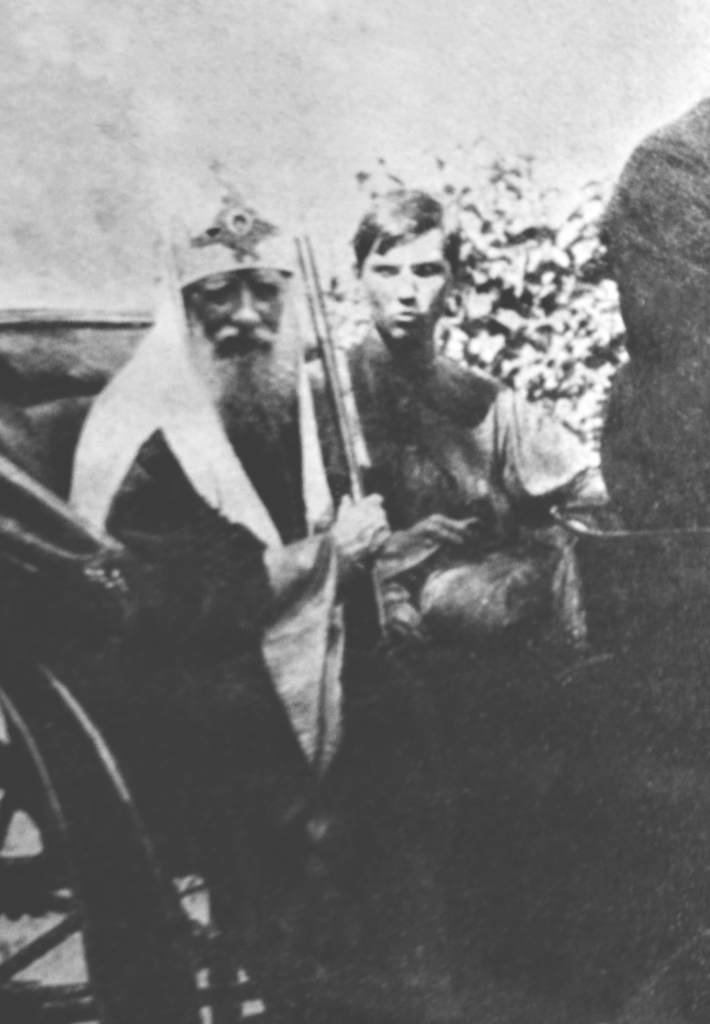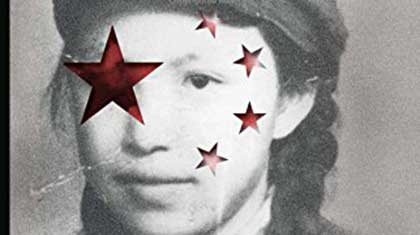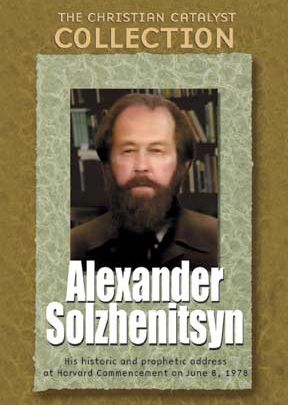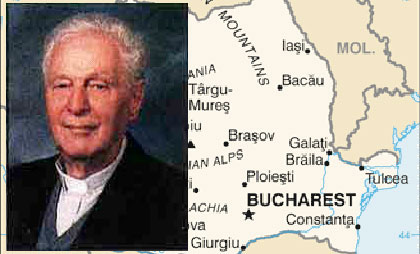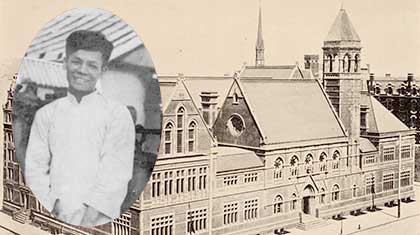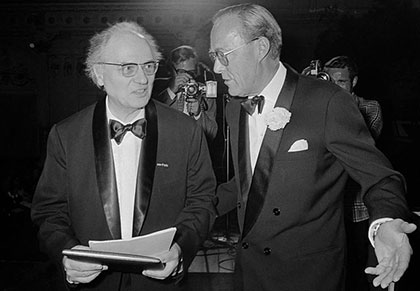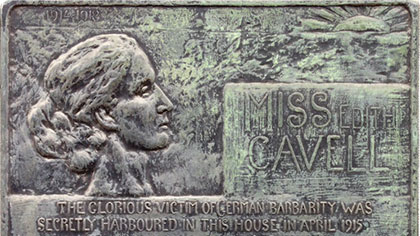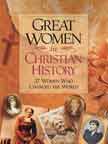
[ABOVE—Concentration Camp Ravensbrück Memorial Site — Prisoner labor station on the area of the former womens camp by Norbert Radtke (Photographer/ self) (Privatarchiv Norbert Radtke) [GFDL (http://www.gnu.org/copyleft/fdl.html) or CC-BY-SA-3.0 (http://creativecommons.org/licenses/by-sa/3.0/)], via Wikimedia Commons]
Adapted from Kaylena Radcliffe’s “A war story: ‘There is no pit so deep God’s love is not deeper still’” that appeared in Christian History issue 121.
Cornelia (Corrie) ten Boom was the child of a poor but generous Dutch Reformed couple, Casper and Cornelia ten Boom. After her birth the family moved to Haarlem in the Netherlands, where Casper took over his family watchmaking business. Their meandering home often overflowed with extended family, customers, and visitors. After 1918 the ten Booms housed displaced German families and fostered missionary children; this hospitality continued after the deaths of Corrie’s aunts and mother. These children were dear to Corrie, who called them her “Red Cap Club.” She later founded Christian girls’ clubs in Haarlem.
Like her elder sister Betsie, Corrie never married. The two worked diligently in the family home and business. Unlike her father, Corrie was business-minded, and her pragmatic management actually turned a profit. Her gifts led to an apprenticeship, and in 1924 she became Holland’s first licensed female watchmaker.
When Hitler rose to power in Germany, his anti-Semitism became public policy. Corrie’s brother Willem, a concerned pastor working with Jews in Germany, brought the news of Jewish persecution home. Corrie later wrote:
When Willem was visiting and would not let us forget, or when letters to Jewish suppliers in Germany came back marked “Address Unknown,” we still managed to believe that it was primarily a German problem. “How long are they going to stand for it?” we said. “They won’t put up with that man for long.”
But put up with Hitler the Germans did.
As a result, Holland’s safety was precarious because Germany eyed its neighbors’ territory and invaded Poland in 1939. Neutral in World War I, Holland again claimed neutrality. With German affirmation that Dutch borders would be respected, Holland’s prime minister took to the radio on the evening of May 10, 1940, to reassure his people. But the war for Holland began only hours later with furious airstrikes throughout the country.
Awakened by the bombings Corrie and Betsie ten Boom were praying earnestly when Corrie experienced a premonition—she, her family, and friends carried on an old wagon out of Haarlem to an inescapable fate. The shooting war in the Netherlands ended within days. Following the flight of Holland’s Queen Wilhelmina and the devastating bombing of Rotterdam, Dutch forces surrendered. German occupation began.
Nazism gained traction and power with every passing month of the occupation, leading to Holland’s National Socialist Bond (NSB). A fascist organization sympathetic to the German agenda, the NSB endorsed Nazi anti-Semitism and recruited members aggressively. Just as in Germany, terrorizing Jews became public policy. Jewish-owned businesses were vandalized, synagogues burned, and those who wore the yellow star vanished daily, their vacant homes filled with NSB families eager to supplant them.
The ten Booms faced a own terrible choice: to watch passively as their Jewish neighbors were deported or to risk losing their lives to save them. Corrie was fifty years old when she joined the Dutch Resistance and offered the ten Boom home as a safe-house for Jews and Resistance workers.
For two years the ten Booms housed, fed, and relocated Jews and others passing through, miraculously obtaining enough ration cards and other supplies despite the watchful eyes of the SS headquarters nearby. The resistance built a secret room with a sliding panel in Corrie’s bedroom.
But they could not evade trouble. On February 28, 1944, the Gestapo raided the ten Boom home. Six people living illegally in the house survived in the hiding place, but Corrie, her siblings, father, and nephews were arrested and transferred to Scheveningen. There Casper ten Boom died. Corrie and Betsie were sent first to Vught, Holland, and later to Ravensbrück in Germany.
Despite brutal conditions, abuse from guards, and the murder of prisoners around them, Betsie and Corrie ministered to women in the camp, sharing the Gospel from a small smuggled Bible. Even as many fellow prisoners turned to Christ, Betsie fell ill and died on December 16, 1944. However, on Christmas Day Corrie received orders of release, later discovered to have been a clerical error.
By the time the war ended, some 110,000 Dutch Jews had been deported to concentration camps, along with many members of the Dutch Resistance.
Afterward, Corrie ten Boom forgave the guards who had held her captive. She touched millions of lives through books and speaking tours before dying on her ninety-first birthday. She often recalled Betsie’s hope-filled words: “There is no pit so deep that God’s love is not deeper still.”
Corrie’s prison experiences resulted in several books. One could excerpt with profit almost any page. Here we have chosen, almost at random, three excerpts relating to three places where she was imprisoned.
At Scheveningen Prison,from A Prisoner, and Yet p. 22, 23
Hardest to bear was my constant worry about Father. He too was lying on a mattress as hard as mine, he with his frail body. Would anyone help him? Betsie and I had always surrounded him with the tenderest of care. And now he was in prison. A prayer welled up in my heart: “O Lord, take him home to Thee in heaven. It will be so good for him!”…
It was now the second week of my imprisonment. I had been very ill for three days. Finally, the door opened wide and I was told to get dressed and to put on a coat and hat.
A hat might never be worn in prison, so I understood that I was going outside. I asked the orderly who came to fetch me where we were going.
“To the consultation bureau.”
A beautiful car was waiting outside. With two other prisoners, an officer and the orderly, I stepped in. Then we rode through the Hague. How natural everything looked and yet how unnatural to us. People were walking freely on the streets, street cars were running, there was a bakery wagon, a garbage truck. The sun was shining brightly; the weather was a delight.
In the consultation bureau I asked a nurse if I might wash my hands. She went with me, closed the door behind us and impulsively put her arms around me.
“Can I help you in any way?” she asked.
“Oh, yes, please; do you have a Bible for me? Mine was taken away on entering the prison. And do you have a pencil, a toothbrush, safety pins?” I asked for a number of useful things. Her cordiality did me much good. In appearance she was not an unusually attractive woman, but love radiated from her.
What a contrast to the evil women in the prison! Does she realize, I wondered, how she has warmed my heart by her friendliness? I shall always remember this encounter with gratitude.
From Vught Prison, Prison Letters p. 89
Does it look like the war will be over soon?
When it’s cold we don’t have enough clothing. Send sweaters or something. We are only allowed to wear it under our overalls and most importantly send new shoes. Mine are completely worn out.…
We are able to witness here and there, but not nearly as much as we had expected. There is so much bitterness and communism, cynicism, and deep sorrow. The worst for us is not that which we suffer ourselves, but the suffering which we see around us. We also are learning to put the worst in the hands of the Saviour. We are very tranquil, in rather good spirits, but not cheerful.
At Ravensbrük concentration camp, from A Prisoner and Yet, p. 113,114.
One day news reached us that a young woman in hospital Barracks 8 had lost courage completely. That was really alarming, for we had often observed that when the will to live was gone the body soon gave up the battle also. We decided to make an effort to get through to her somehow.
Visiting in the hospital was strictly forbidden. But five of us went over there. In a corner near the barracks we held a simple prayer meeting. Then I set out. I knew which window was nearest her bed, but saw at once that the shutters were closed.
I went back and we prayed together: “Lord, wilt Thou cause the shutters to be opened?” A Lagerpolizei passed the barracks and opened the shutters. Again I went over and stood next to her window, but now there was a new difficulty-the window could not be opened from the outside.
So once more I went back to my friends and we prayed together that the window might be opened. Before I got back a Polish woman had opened the window from the inside.
Then I began my conversation: “Willy, can you hear me?”
“Oh, yes, how wonderful that you have come! I am so discouraged. I have such dreadful pain, and everything is equally depressing.”
Whack! A Lagerpolizei slapped me. “Move on!” she snarled.
Back to my friends I went. “Lord wilt Thou keep the Lagerpolizei away from me and give me comforting words for Willy,” I prayed. Then I went back and stood a bit farther from the window. The Lagerpolizei was nowhere to be seen.
“Willy, remember that the Lord Jesus loves you. When you have pain, think about His sufferings, which He bore for your sins and to direct you on the road to heaven. That is why the suffering of this present time is not to be measured against the glory which is to come. If you take hold of the Saviour’s hand He will keep you close to Him and help you through, and then this tribulation will work for you an eternal weight of glory.” I continued speaking quietly to her in this manner for a little while, until she finally called out: “Now I see things clearly again. It is all gloriously true, and my courage has come back. You have comforted me. Thank you very much.”
Whack! Another slap from the Lagerpolizei! She banged down the window and closed the shutters. Further conversation was impossible, but I knew that Jesus had again conquered and that Willy was comforted. Back in our corner near the barbed-wire fence we thanked God that evil had not won.


